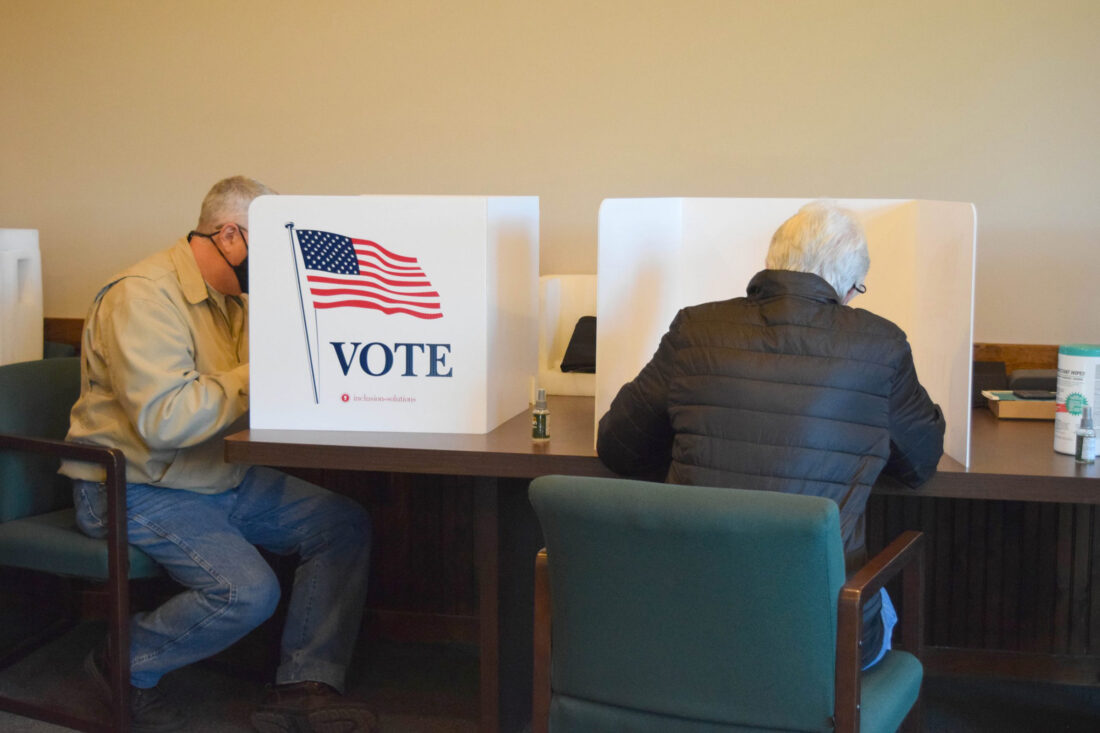Essex County sees spike in write-in campaigns

North Elba residents vote at the Lake Placid Beach House in 2021. (Enterprise photo — Lauren Yates)
ELIZABETHTOWN — The coming November elections in Essex County are expected to include an unusually high number of write-in campaigns, underscoring the importance of local messaging and voter education.
Essex County Republican Commissioner Roy Holzer said the number of write-in campaigns this year is unprecedented, as far as he can recall. While it is difficult to officially confirm the number of write-in campaigns because candidates are not required to file official petitions, as many as nine towns in the county could have at least one write-in campaign.
This includes campaigns for town supervisor in Willsboro, Wilmington and Ticonderoga and candidates for town council in Chesterfield and Wilmington. Wilmington is also expected to have a write-in campaign for assessor and a retired Lake Placid lawyer has announced a write-in campaign for town justice, after both seats had no petitions filed.
There were also no petitions filed for clerk in the town of Keene and assessor in the town of Essex, so it is possible there might also be write-in campaigns for those roles.
–
Why so many write-ins?
–
In 2019, state election law was changes so that primary elections take place in June instead of September. This means that the deadlines to file petitions or collect signatures for local government seats is now much earlier in the year.
Holzer said the increased number of write-ins, as far as he can discern, is mostly due to the earlier deadlines and the challenges people face to file their petitions or hold caucuses in time. Now, the process starts in February the year they are running.
“People are not thinking politics in February, March, April and May,” he said. “By the time you get to a normal time when someone could still file anindependent petition in years past, now their only option is to run as a write-in.
“I feel the state did such a disservice to communities across our state, because local issues deserve special attention and they shouldn’t get looped in with state and national politics.”
To read more about the latest change in election law, which, if upheld by the courts, will move elections in odd numbered years to even numbered years, visit tinyurl.com/4f2f86t4.
Tina Terry Preston, a current first-term council member in the town of Wilmington, is running again for that position as a write-in. She wasn’t initially planning on running, but changed her mind after talking with people who have a lot of concerns and felt there weren’t enough people on the ballot.
Preston said she hopes to continue to address concerns about rising costs and taxes, forestry and zoning reform. She said Wilmington needs new zoning laws, but thinks it needs to be a comprehensive revision, not a “piecemeal effort.”
“Our community has become very divided and we need to bring them back together,” she said. “You can’t function if you’re not working together.”
There are also several races where incumbent candidates have decided to retire and will not accept the seat if they are elected. There is no way, procedurally, for them to be removed from the ballot at this stage, Holzer said.
“The election law needs to be taken a look at, as far as how it can be more user-friendly for the voter,” he added.
Sam Haselton, who is running for supervisor in Wilmington, was one of these candidates. He decided to run after Favor Smith, who was nominated and will still appear on the Republican line on the ballot, announced his retirement in August.
There is a similar situation in the town of Willsboro, where Supervisor Shaun Gillilland also announced his retirement earlier this summer. Tracie McGill, who has lived in the area full-time since 2016 and has family ties dating back to the 1950s, is now running as a write-in candidate.
“I felt really compelled to jump in,” she said.
McGill had been planning to run anyways, but some personal circumstances delayed her efforts to submit a petition. She has a finance and tech background that she hopes to put to use in service of the town. She said her platform is focused mainly on transparency and fairness, finding new and improved methods to keep residents informed about the town and its budget.
Even though the timing of the deadline was the main impetus for her write-in campaign, it has also allowed her to seek bipartisan support. She said she isn’t affiliated with either political party but has seen great support from both sides, which has been encouraging.
“It’s also telling me folks are looking for leadership that is listening to all perspectives and not being divisive,” she said.
Zoanne Schnell is running for town council in Chesterfield. Her platform in part motivated by her background in nursing and her concerns about the impact of health care policy changes on the community.
“I thought, ‘Well, what’s one way that I can help support our community?'” she said, “and one would be running for a town position so that there would be more voice from the town to our representatives on up the ladder.”
She was in a relatively unique situation as she considered running for a seat. She is a registered Democrat, but most of the town counselors in Chesterfield are Republicans and the town hasn’t had a Democratic caucus recently. For this reason, she decided to run as a write-in and is working with a group of community members to get a caucus together for future elections.
–
What voters should know
–
Choosing a write-in candidate is not complicated, but there are a few things election commissioners say people should keep in mind.
To vote for a write-in candidate, look at the top of the ballot to find the position you want to vote for, go to the bottom of the page where a “write-in” section is clearly marked, and write a name inside the box. New York state clarifies that what matters in a write-in is “voter intent,” which means it doesn’t matter if names are misspelled as long as election workers can tell who you mean.
Each voter is allowed up to three tries with a ballot — if you make a mistake, you can turn in the voided ballot to get another one. However, once the ballot goes into the machine, the vote is final. If you need assistance, one poll worker from each party can help you.
Democratic Election Commissioner Mary McGowan said that any markings on the ballot need to be inside the box — the machine won’t read anything outside the box.
Both Essex County commissioners noted that it also takes longer to count write-ins, about a week, since they need to be read and counted by hand. However, there are sometimes clues that a write in candidate did well if the initial vote shows low counts for the people on the ballot.
“It’s a lot more work on our part in the board of elections office,” McGowan said. “Machines don’t read handwriting, so we have to physically pull those and read each one and make the decision as to what the voter intent is.”
Most of the time, the name is obvious and isn’t a problem. However, she said that the responsibility falls to the people running campaigns to circulate information about their campaign, what their name is and how to write it on the ballot.
The vote counts are done by a bipartisan group with two Democrats and two Republicans, in a public place where the process can be observed, Holzer noted.





